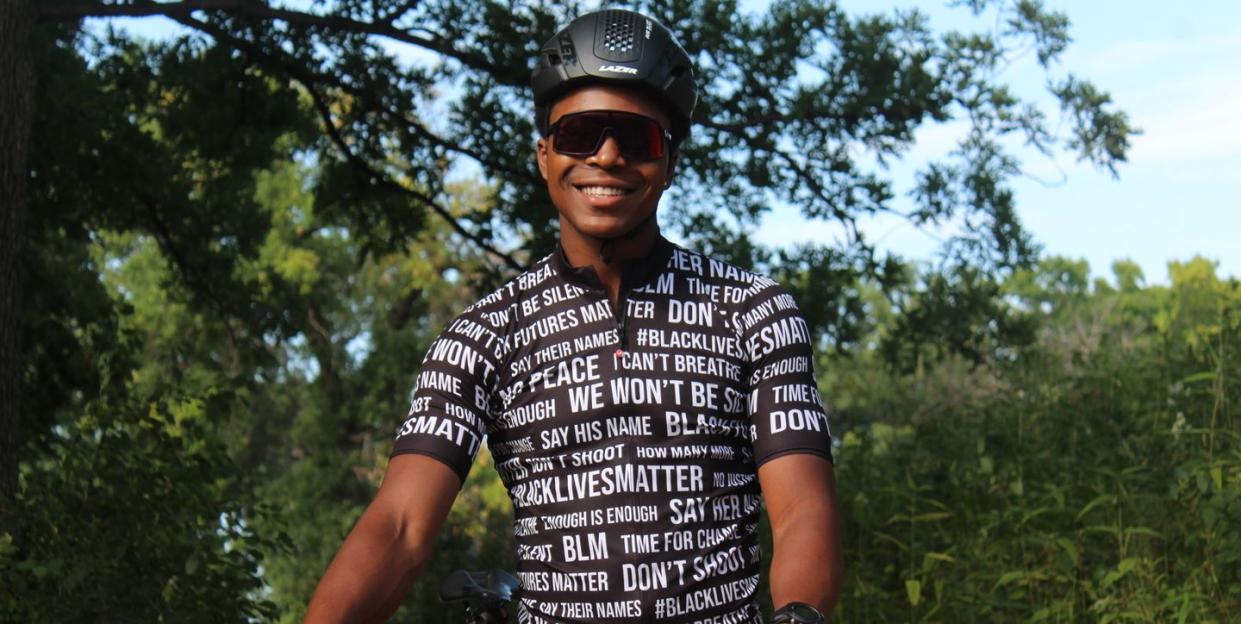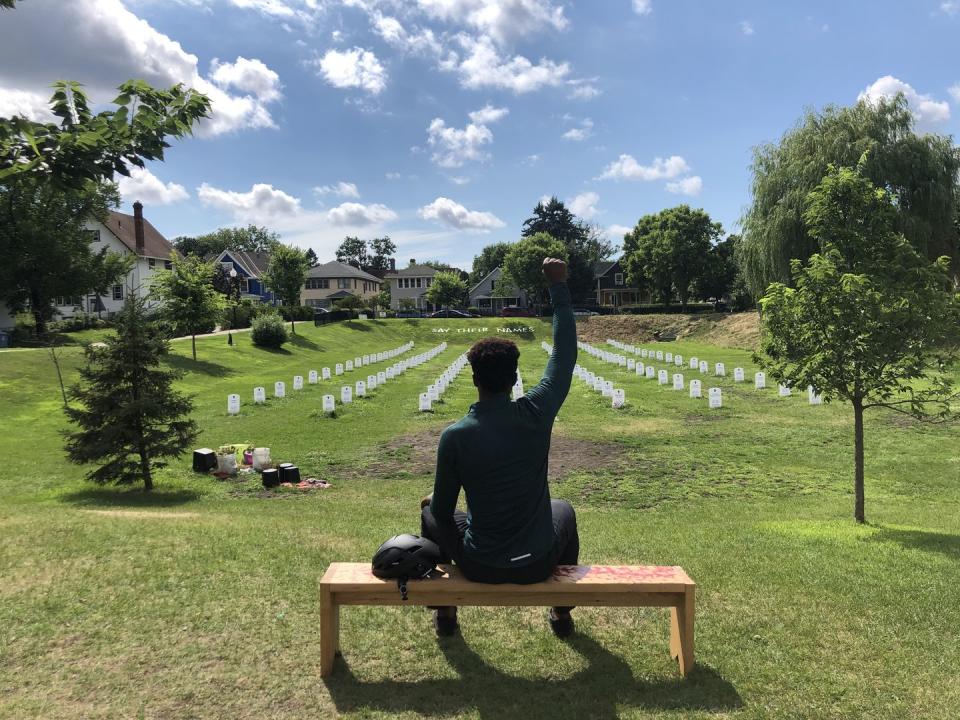By Handing out Helmets and Lights, Raequan Wilson Is Making Cycling Safer for POC

I live with the reality that as a Black man, I’m targeted. I’ve had people call the police on me because my bike is too nice. I’ve had police ask me what I’m doing with my mountain bike while I’m at a trailhead.
It just hurts. It really, really hurts. Being Black is definitely courageous.
Bicycling All Access can help you become a stronger, healthier rider!
This year, I did a Juneteenth ride—The Juneteenth Revolutionary Black-out Bike Ride—with hundreds of Black riders in Minneapolis, where I grew up. In the middle of the ride, the group stopped and took a moment of silence for George Floyd, and all of the other fallen brothers and sisters out there.
At first I thought, this is cool, but I didn’t sign up for this—I signed up for a ride. And then I realized that there are so many layers to riding with Black and Brown riders. So we took 8 minutes and 46 seconds of silence that day, the amount of time that George Floyd was pinned under the officer’s knee, and I remember just silently crying. Eight minutes and 46 seconds is a long time, and it really hit home. This should not be happening. No one should have to go through anything like what George Floyd went through.
I went home and called my mom, and I told her about this amazing thing that I didn’t expect to do. I just needed to reflect with her—I had so much emotion around it. I told her about the 8 minutes and 46 seconds, and I asked her to sit with me on the phone for 8 minutes and 46 seconds so that we could connect over this—I wanted her to know what I was talking about. So we sat there together. And at the end I said, ‘Mom, you know I have to do something. You know that, right?’
That night I started thinking about what I could do to make a change. I knew there were people who were going to peacefully protest, but I’m not the kind of person who is going to be on the front lines in that way. I needed to do something my own way.

I think of riding my bike as ride-therapy. I’m able to reflect and recenter myself, and I’m able to find some balance. So I came up with #IRide4Them. The project started with the idea of riding 846 miles (for 8 minutes and 46 seconds) to Colorado, but I shut down that idea because of the pandemic, knowing I’d be passing through so many small towns. I didn’t want to be the person who spread COVID-19 across the country—I wanted to be mindful. I was doing this ride because I care about people, so I wanted to make sure that everyone was safe.
So I thought I’ll do it here in Minneapolis, and I wanted to have a lot of people ride with me. But again, with COVID-19, I knew I couldn’t safely do that, so I decided to do it solo. I decided to ride 846 miles over 10 days, and start each ride where a Black person had been murdered, to show how this had impacted my community. These men were murdered where I walk, bike, and breathe, and doing this made me feel more connected to those lives and my community.
Black people do not feel safe in outdoor spaces right now—or really, just in general. And I asked myself, how can I create a safer community for my Black and Brown people, and what does that even look like? The answer came to me surprisingly quickly.
During those two days when I was deciding how I was going to do the ride, I saw these two little Black kids on their bikes in the dark—it was around 9 p.m., and I thought, that’s not safe. So I pulled my car over and asked, ‘What are you guys doing? You can’t just be out riding at night.’
I talked to them for a while, and I asked them if I could give them my [bike] lights and helmet. I gave them everything I had in my car, and then started thinking that I need to do something about this because not only are these little Black boys riding in the dark, but they’re also not safe in the community, just like George Floyd wasn’t safe.
So I decided that in order to build a safer community, I can hand out bike lights and helmets, and talk to kids about being safe. I set up a GoFundMe to raise money for that mission, and to fund additional 84.7-mile rides each month.
The [#IRide4Them] rides [from August 1 - August 10] were so powerful for me. And every day, I felt like I was risking my life, especially when word got out, and the news crews were following me. I knew that people could perceive me and my Blackness as a threat. It got a lot of press, and it was televised, so people knew what I was doing and what I looked like. They knew I was wearing a different T-shirt every day to commemorate a life.
I started worrying, maybe someone will run me off the road. Every day I left the house thinking that maybe I won’t come back. People get run off the road all the time just for being on a bike—add to that being Black, and being Black with a mission.
I was out there for six hours every day, 84.6 miles for 10 days in a row, and it really helped me to reflect. Every day I started somewhere different—at a place where a Black man was murdered—and every day ended at the Say Their Names Cemetery. So it was kind of like I was bringing them to rest. Starting at the place where they fell, and bringing them to the cemetery.
Earlier this year, William Lloyd—who formed The Black Foxes, an international collective of Black cyclists—reached out to me and told me that they wanted to form a group of dope Black people to normalize Blackness in outdoor spaces. He told me the group wanted me and my energy on their team. And I was like, ‘Well, duh, of course I want this community.’ We’re all doing these cool things, and shining our lights. When we bring all of that together, we’re just going to be so bright you have to put on the blue blockers. The Black Foxes have a large following, and I now have access to that audience—we all have a larger audience now, which will help us all spread our stories.
My advice for everyone is to continue to do the work of making the world safer. Be sure that you’re doing something that makes a difference. I’m still using my GoFundMe, in which $18,465 has been donated so far, to buy and hand out helmets and lights, but I like it to be a little bit low key. I’m not doing this for people to see it, I’m doing this because I want people in my community to be safe. I’ve handed out at least 1,000 helmets so far. I just want everyone to be safe. And that’s so simple, but also so complicated.
The thing I want to think about moving forward in my focus of creating safer outdoor spaces for Black and Brown people, is to ask, “What don’t we talk about that we should talk about?” I want to be the voice that speaks out, that says the things that aren’t supposed to be said. For instance, I’m a sexual assault survivor. And I’ve realized that people die in different ways. You have to create a new you, because you’ll never be the person you were before something like that.
I want to talk about my experiences because it all comes back to safety. Maybe it starts with helmets, but I want to talk about all versions of safety, because not many people are talking about it. We need to create the space where we can talk about what safety really means. And everyone can do that.
To donate to Raequan Wilson’s #IRide4Them GoFundMe, click here. A portion of the funds will go toward building a safer community in Minneapolis by providing lights and helmets to cyclists in need. Another portion will go toward funding Wilson’s monthly 84.6-mile bike ride in honor of fallen Black people.
You Might Also Like

